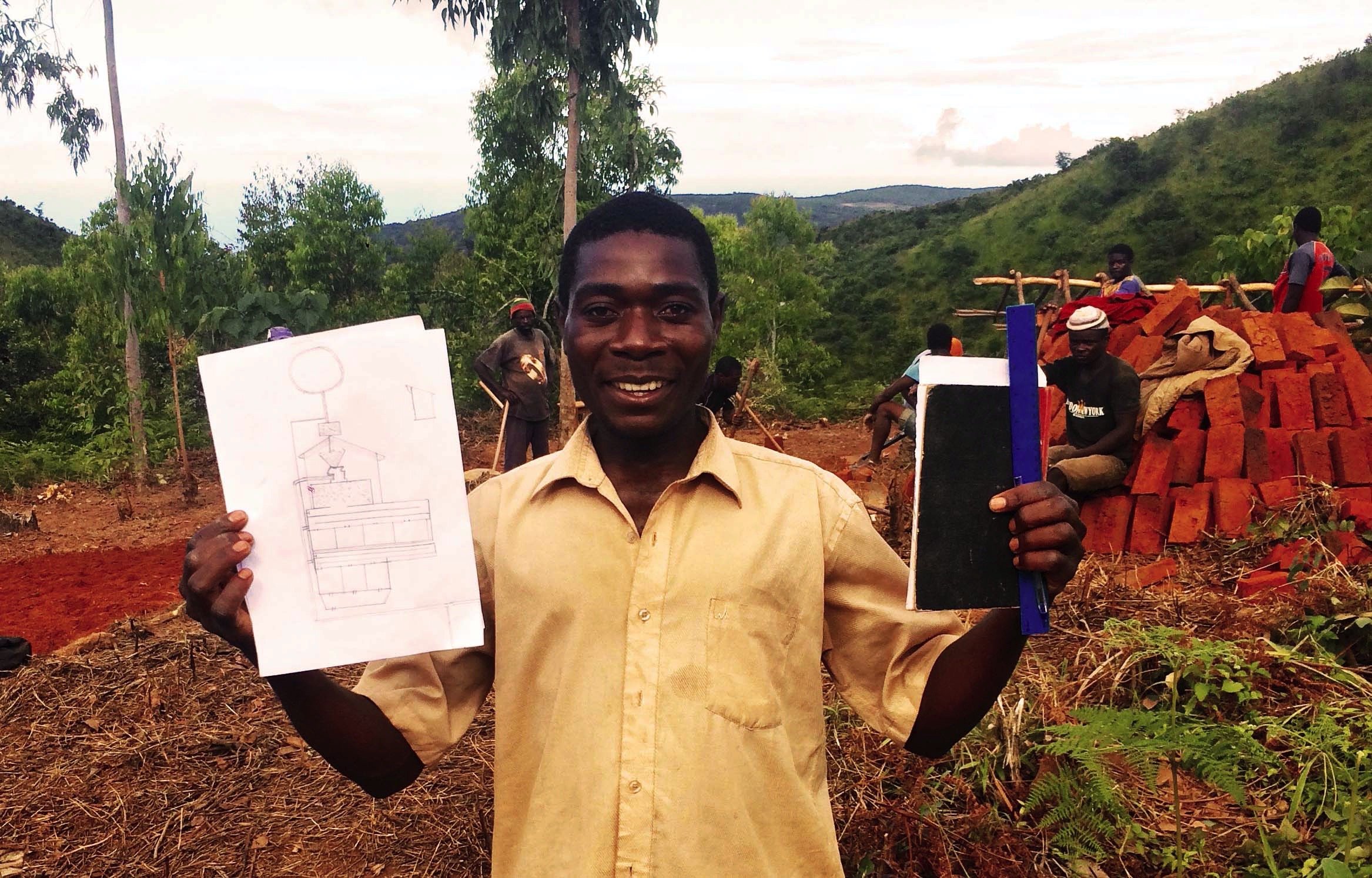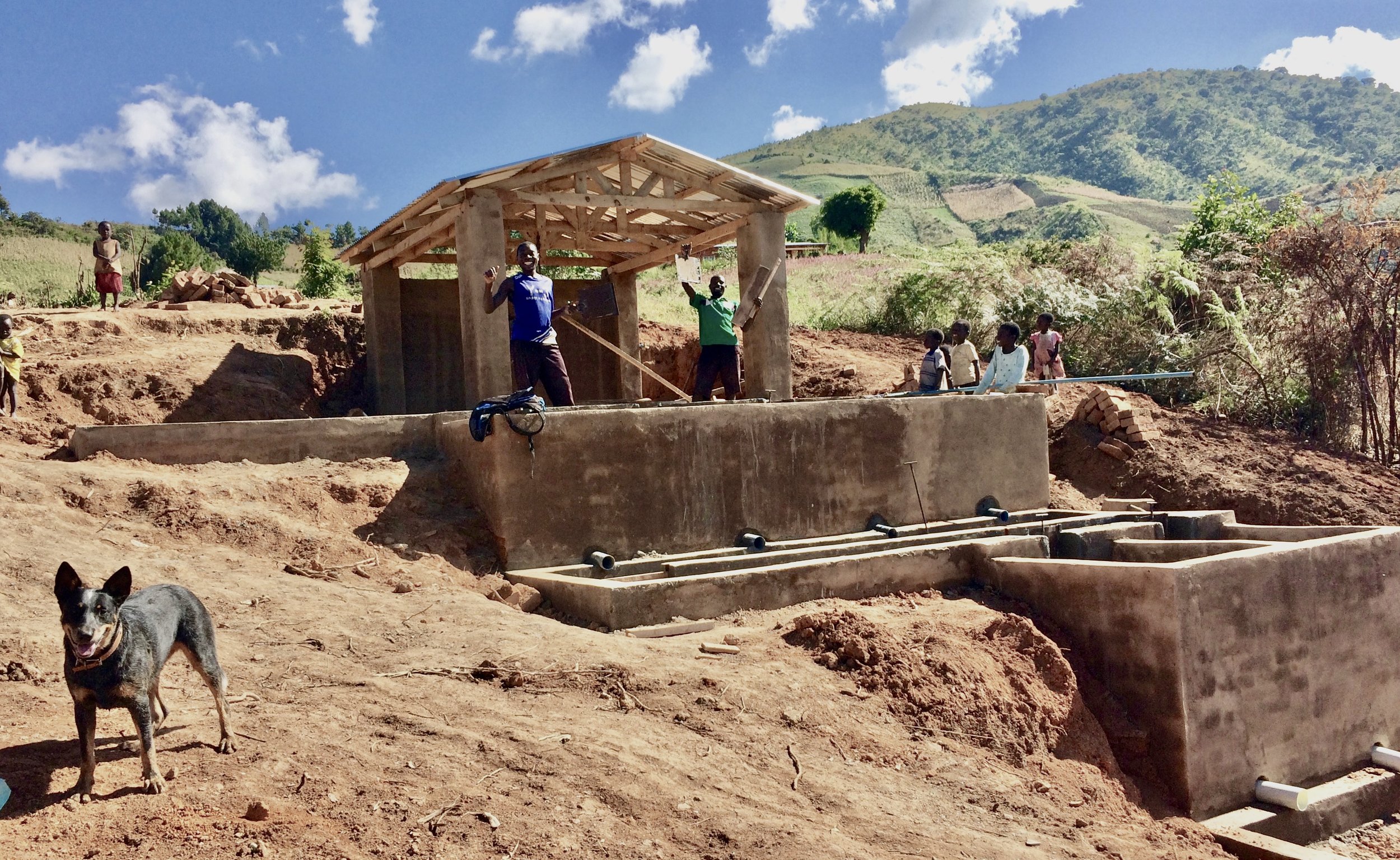Our Story (Barista Magazine)
MF Coffee Project
In 2013, I moved from North Carolina to Manchewe, Northern Malawi. My sister and I took over an off grid eco-lodge, catering mainly to adventurous backpackers. Perched on the side of a cliff, an hour's off-road journey from the nearest tarmac road and a three hours drive from the closest big town.
Manchewe is the world's most beautiful village. The whole community rests on the edge of a cliff, overlooking the giant Lake Malawi, while Tanzania unfolds on the other side. In the middle of Manchewe resides Malawi's highest waterfall, Manchewe Falls, the "MF" in MF Coffee Project.
Living off the grid meant a few solar panels, tapping into gravity-fed spring water, and enjoying the lively company of chickens and pigs. While our permaculture garden chipped in with some produce, the heart of our fruits and veggies came from local farmers. The Manchewe community, along with neighboring villages like Nkhota and Junju, welcomed my sister and me with open arms and really made us feel at home from day one.
As I connected with local farmers, the idea of buying coffee was suggested. Being a coffee lover and having our supply from a city three hours away, I thought, "Why not?" This led me to explore some of the area's coffee farms, where I had the pleasure of meeting Lyson, a co-founder of MF Coffee Project, a coffee farmer, and an all-around coffee expert. Lyson and I hit it off, driven by our shared passion of coffee and adventure we eagerly explored the neighboring areas on bicycles and dirt bikes, visiting countless coffee farms.
The experience of visiting smallholding coffee farms always felt magical, surrounded by beautiful rolling hills. Imagine a smallholder farm as a harmonious blend of an ecosystem and a traditional farm, where everything has a purpose. Bananas entwined with avocados, mangoes, and oranges, maize fields adjacent to sugarcane, and intricate water systems nourishing the entire farm. Within this vibrant tapestry stood coffee trees—shade-grown and thriving.
Lyson and I started to purchase small amounts of green coffee, roasting them on our bicycle-powered roaster and selling at The Mushroom Farm (our lodge)
Embarking on a journey from one coffee farm to another served as an eye-opening education, laying bare the challenging truths of the coffee industry. We encountered remarkable farmers subjected to the whims of global forces, faced fluctuating prices, and observed a palpable disconnection in the coffee world.
The absence of financial incentives for cultivating specialty varieties or organically grown coffee or speciality processed coffee prompted our realization that the prevalent approach—treating coffee as a commodity—was fundamentally flawed in dealing with smallholder coffee farmers. We firmly believed that smallholder coffee farmers, with their intimate connection to the land, were ideally positioned to cultivate specialty coffee. This, in our view, should be coffee with a unique narrative, infused with care, and nurtured by a dedicated farmer and their family, embodying a direct link to the harvest. This, to us, is the true essence of specialty coffee.
Lyson's village, Nkhota, tucked 2 miles up the mountain, became a focal point. Coffee farming, once prominent, had lost its allure, with many replanting coffee plots with more profitable crops. A lack of a centralized washing station and market disillusionment drove farmers away from growing coffee.
Teaming up with the Nkhota community and local chefs, we envisioned a communal washing station in 2016. Designed by Lyson, this station aimed to empower farmers.
Lyson and I, self-proclaimed coffee nerds, were inspired to delve into experimenting with processing techniques, aiming to elevate the quality of the already outstanding local coffee.
By sending green coffee samples worldwide, we gained insights into areas of improvement and began to understand more about the coffee world.
We began collaborating with a close-knit group of 48 coffee farmers, simultaneously setting up drying beds in the neighboring village of Junju. Together with Noel Nyrenda, an exceptional coffee farmer, we laid the foundation for MF Coffee Project. This collective, consisting of friends and relatives of Lyson and Noel, officially registered as Tiko Coffee Collective, has remained our exclusive and steadfast partner since its inception.
Over time, we honed our expertise in various aspects such as variety, premiums, grading, drying, moisture testing, bagging and transporting coffee. These were skills we had to develop from scratch. As we improved the cupping scores for our coffee, we managed to secure interest in our green coffee. Yet, the sense of vulnerability to global forces persisted, prompting us to reconsider the fundamental structure of our business. We were determined not to remain green coffee brokers subject to external assessments of our coffee's value. Fully aware of the exceptional quality of our coffee, we started exploring avenues to independently bring it to market.
In March 2020, my sister and I handed over The Mushroom Farm to a wonderful American couple, former Peace Corps volunteers. The farm, with its bike-powered roaster, continues to thrive. By then, Lyson, Noel, and I had fully embraced our roles as coffee enthusiasts, paving the way for our foray into international markets.
Choosing Scotland as a place to set up shop was a natural decision, I have British citizenship and there is unique and positive historical connection between Malawi and Scotland. Scotland's vibrant coffee scene, coupled with its progressive ethos, made it an ideal destination for MF Coffee Project.
Fast forward a few years after relocating, working as a barista, attending numerous cuppings, selling at trade shows and farmers markets and gaining insights into how coffee is bought and sold in the UK. We are now roasting MF coffee at our coffee haven, MF Coffee Shop, in Edinburgh.
Following a successful month-long MF Coffee Project pop-up, we were invited to take over the coffee shop within the eclectic arts venue known as Summerhall. Once a veterinary university transformed into an alternative arts space, Summerhall perfectly aligns with our mission—roasting coffee and connecting with MF enthusiasts.
Meanwhile, Lyson, Noel, and the Tiko team persist in their dedicated efforts in Northern Malawi to produce exceptional coffee, handling everything including innovative processing methods. We stay connected through WhatsApp, exchanging updates every day between Malawi and Scotland. This period has been a genuine exploration into the intricate logistics of shipping, storing, roasting, and selling coffee
Thanks to our close-knit connections with Malawi and the Tiko Coffee Collective, alongside our newly established base in Scotland. We firmly believe that by seizing control of the entire coffee journey, forging a direct link to the coffee's origin and the farmers behind it, we can continually raise these numbers. What truly distinguishes us as a coffee roaster is our exclusive partnership with a small group of coffee farmers. Rather than focusing on the country of origin, we differentiate our coffee based on variety and processing technique. This unique approach empowers us to invest, grow, and expand hand in hand with the Tiko Coffee Collective year after year.
During my time in Malawi, I collaborated on a hydroelectricity initiative named Chipopoma Power NGO. Spearheaded by John Silous, a self-taught electrician and engineer from Manchewe, we initiated the project in 2015, harnessing the power of Manchewe Falls, Malawi’s highest waterfall to supply hydroelectricity to over 100 homes, multiple businesses and the local primary school. Operated by a community board, Chipopoma Power NGO has brought renewable electricity to an area that previously lacked access. Witnessing the positive impact has been extraordinary—entrepreneurs emerging, from hairdressers to maize mills, carpentry shops to welders, all powered by renewable, community-run hydroelectricity. The local primary school's grades improved as students could study at night, and deforestation decreased with electricity replacing traditional cooking methods.
At MF Coffee Project, our next endeavor is to construct a dry mill, adding more value to the coffee's origin. This involves utilizing Chipopoma Power and ensuring sustainable practices by paying the tariff rates. We strive to become a genuinely environmentally conscious coffee producer.
Additionally, the farmers we partner with embrace organic compost practices, despite lacking formal certification, and foster shade-grown coffee. Our emphasis on the smallholding farm ecosystem underscores our commitment to environmentally friendly coffee production. Working closely with generational farmers of the area, we prioritize their land ownership, resisting the prevailing trend of external companies acquiring vast expanses for monocropping. Our dedication goes beyond curating a sample farm that showcases unique coffee varieties and introduces innovative composting techniques; it is deeply rooted in our collaboration with Tiko—the driving force behind our existence







